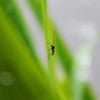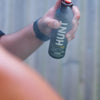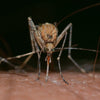Your Mosquito Repellent: DEET vs. Picaridin

DEET vs. Picaridin: The Safer Choice for Mosquito Protection
Mosquitoes and ticks are more than just a nuisance—they can carry harmful diseases like West Nile Virus, Zika, Dengue fever, and Lyme disease. When choosing the best mosquito repellent, two of the most common active ingredients are DEET and Picaridin. However, research suggests that DEET may pose serious health risks, making Picaridin the safer and more effective choice. If you're searching for a non-toxic insect repellent, keep reading to learn why Picaridin is the best alternative.
The Hidden Dangers of DEET
DEET (N, N-diethyl-meta-toluamide) has been widely used for decades, but it comes with potential health risks. Studies have linked DEET exposure to neurotoxicity, skin irritation, and even potential harm to the central nervous system. High concentrations of DEET have been associated with seizures and memory loss in rare cases. Furthermore, DEET can degrade plastics and synthetic materials, posing a risk to your gear. If you’re looking for a safe bug repellent for kids and adults, DEET may not be the best choice.
Why Picaridin is the Safer Alternative
Picaridin is a synthetic compound derived from piperidine, a natural ingredient found in black pepper plants. It is just as effective as DEET in repelling mosquitoes and ticks but with far fewer health risks:
-
Low toxicity: Picaridin does not have the same neurotoxic concerns as DEET, making it a safer insect repellentfor regular use.
-
Non-greasy and odor-free: Unlike DEET, Picaridin-based repellents feel lightweight, are non-sticky, and do not have a strong chemical smell.
-
Safe for gear and clothing: Picaridin won’t degrade plastics or synthetic materials, making it an excellent choice for hikers, campers, and outdoor enthusiasts.
Which Mosquito Repellent is Best for Kids?
If you’re looking for a mosquito repellent safe for babies and children, Picaridin is the preferred choice. Unlike DEET, which is not recommended for infants under two months and can cause skin irritation and allergic reactions, Picaridin is gentle and effective. The Centers for Disease Control and Prevention (CDC) recommends Picaridin as a safe alternative to DEET for young children.
Avoiding Toxic Chemicals in Bug Repellents
Although DEET has been deemed effective, the potential dangers of DEET make Picaridin a smarter option. Studies suggest that prolonged exposure to DEET may lead to neurological issues, making DEET-free mosquito repellents a better alternative for long-term use.
Choose a Safer Alternative
If you’re searching for a harsh chemical-free bug spray that offers long-lasting mosquito protection, try Hunt Repellent. Our repellent provides powerful defense against mosquitoes and ticks—without the risks associated with DEET. Stay protected and enjoy the outdoors safely with Hunt Repellent!
For more information on DEET-free insect repellents, visit HuntRepellent.com.
-
Posted in
Baby safe, bugspray, clean ingredient, Deet, Deet Free, EPA approved, kids bug spray, mosquito, Mosquito control, Mosquito Repellent, Mosquito spray, mosquitos, OFF, Safe Alternative, Scent Free, Skin




